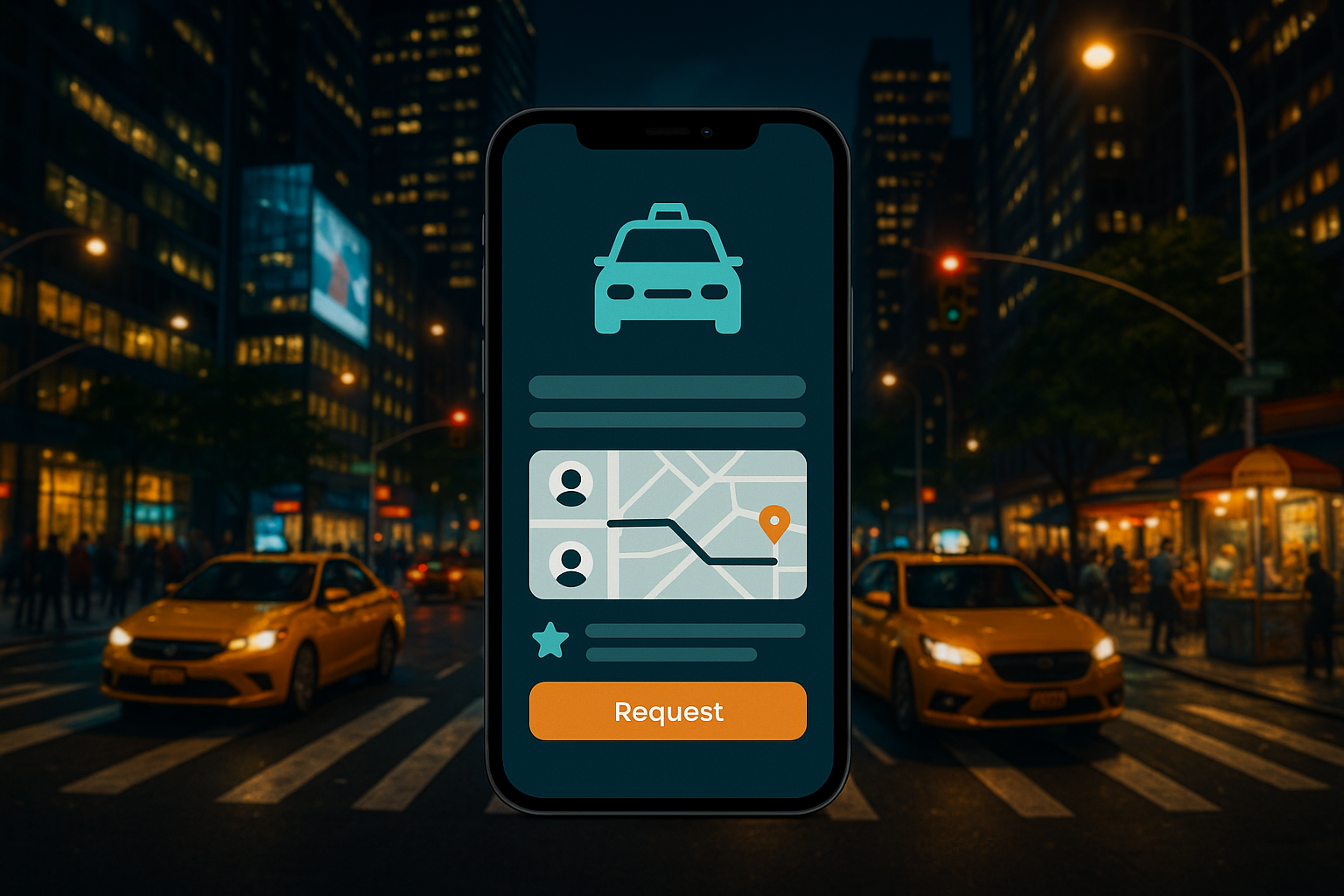Introduction
In the last decade, the tap of a button on a smartphone has fundamentally reshaped urban transportation. Ride-hailing or “cab” apps like Uber have become an integral part of modern life, offering unparalleled convenience for moving from point A to point B. The immense success of these platforms has inspired countless entrepreneurs and businesses to venture into the ride-hailing market. However, the path from a great idea to a successful, functional cab app is fraught with complexity, significant financial investment, and immense technical challenges.
Developing a robust, scalable, and user-friendly cab app is not a simple task. It involves creating a sophisticated ecosystem that seamlessly connects passengers and drivers in real-time, handles secure payments, calculates optimal routes, and provides a reliable user experience across multiple platforms. This article serves as a comprehensive guide to cab app development. We will explore the inherent difficulties of building such an application, break down the associated costs, analyze popular business models, and identify the leading development companies that can turn your vision into a reality.
As a top US AI-powered mobile app development firm with over 20 years of experience, we at MetaCTO have guided numerous businesses through every stage of the app lifecycle. We understand the intricacies of building complex applications, from initial concept validation to launch, growth, and monetization. We specialize in transforming ambitious ideas into market-ready products, and this guide will share some of the critical insights needed to navigate the world of cab app development.
What is a Cab App?
At its core, a cab app is a mobile application that facilitates on-demand transportation services by connecting passengers who need a ride with available drivers nearby. This model bypasses traditional taxi dispatch systems, offering a more direct and efficient alternative. The entire process is managed through a digital platform, typically consisting of two distinct applications—one for the rider and one for the driver—that communicate with each other through a central server.
The user experience for a passenger is designed for simplicity and convenience. A user opens the app, which uses geolocation to pinpoint their current location. They then enter their desired destination, and the app provides an estimated fare and wait time. Upon confirming the ride request, the system alerts the nearest available drivers. Once a driver accepts the request, the passenger can see the driver’s details, vehicle information, and track their approach in real-time on a map.
Simultaneously, the driver’s app provides them with navigation to the pickup point and then to the passenger’s destination. Essential features like push notifications keep both parties informed about the ride status, such as when the driver has arrived or when the trip has started and ended. The platform also integrates secure, cashless payment gateways, allowing for seamless transactions at the end of the journey. This entire ecosystem is built on a foundation of complex technologies working in unison to create what appears to the user as a simple, effortless service.
Reasons It Is Difficult to Develop a Cab App In-House
Embarking on the journey to build a ride-sharing app internally presents a set of formidable challenges. The allure of having a dedicated team under one roof can be strong, but the practical realities often prove to be a significant barrier for many companies, especially startups. The primary obstacles are the immense cost and the substantial time commitment required.
Building an app like Uber is an inherently costly endeavor. The financial outlay extends far beyond developer salaries. You need a multi-disciplinary team with specialized skills. This includes iOS developers, Android developers, backend engineers, UI/UX designers, quality assurance testers, and a project manager to orchestrate the entire process. The skill level and geographic location of this team significantly impact costs. For instance, hiring developers in high-cost regions like North America or Western Europe is considerably more expensive than in other parts of the world. Beyond salaries, there are costs for software licenses, third-party API usage, server infrastructure, and ongoing maintenance. The cumulative expense can quickly escalate, making it prohibitive for businesses without deep pockets.
The process is also incredibly time-consuming. Developing a feature-rich application from scratch is a marathon, not a sprint. The complexity of the core functionalities alone demands a massive investment of time and resources. Consider the following:
- Real-Time Tracking and Geolocation: Implementing accurate, real-time GPS tracking for both riders and drivers, along with dynamic routing and route optimization, is a complex engineering task. It requires integrating sophisticated mapping services and ensuring data is transmitted and updated instantly without draining device batteries.
- Payment Gateway Integration: Securely integrating multiple payment options requires meticulous attention to detail and compliance with financial regulations like PCI DSS. Integrating these third-party services adds development time and potential licensing fees.
- Multi-Platform Development: To reach the entire market, you need an app for both iOS and Android, and potentially a web-based portal. Developing and maintaining separate native codebases for each platform doubles the development effort and time.
These challenges are precisely why many businesses choose to partner with an experienced development agency. At MetaCTO, we provide a complete, expert team that mitigates the risks of in-house development. Our established processes and deep technical expertise allow us to build and launch custom mobile applications far more efficiently, reducing both your time-to-market and overall costs. We handle the entire journey, from strategy and design to launch and post-launch growth, allowing you to focus on your business while we handle the technical heavy lifting.
Popular Business Models for Cab Apps
Choosing the right business model is critical to the long-term profitability and success of your cab app. The model dictates how you will generate revenue and has a profound impact on user acquisition and driver retention. The profitability of any given model depends on factors like market saturation and user behavior, but a few have emerged as the most popular and effective options in the ride-hailing industry.
1. The Commission-Based Model
This is the go-to model for most established ride-hailing giants like Uber and is often the most profitable. The concept is straightforward: the platform takes a percentage of the fare for each ride completed through the app.
- How it Works:
- Driver Commission: The primary revenue stream comes from charging driver partners a commission on every fare. This percentage is deducted automatically before the driver receives their payout.
- Passenger Service Fee: In some cases, a small service fee is added to the passenger’s bill for the convenience of using the platform.
- Surge Pricing: During peak hours, high-demand events, or bad weather, the platform can implement dynamic or “surge” pricing. This increases fares to incentivize more drivers to get on the road, and it also significantly boosts revenue per ride.
2. The Subscription Model
This model focuses on building customer loyalty and creating a stable, predictable stream of income. Instead of paying on a per-ride basis for platform access, users pay a recurring monthly or annual fee for a premium level of service.
- How it Works:
- Subscription Tiers: Offer different levels of membership with varying benefits. For example, a basic tier might offer a set number of discounted rides per month, while a premium tier could provide unlimited priority bookings, fixed fares regardless of demand, or access to luxury vehicles.
- Free Trials: Attract new users by offering a free trial period. This allows them to experience the value of the premium offerings firsthand, increasing the likelihood of conversion to a paid subscription.
- Loyalty Rewards: Reward long-term subscribers with exclusive promotions, early access to new features, or additional discounts to encourage retention.
3. The Freemium Model
The Freemium model is an excellent strategy for startups looking to acquire a large user base quickly. It works by offering a core set of services for free while charging for advanced features or an enhanced experience.
- How it Works:
- Free Core Services: Essential functionalities like standard ride booking and real-time tracking are offered to all users at no cost.
- Premium Upgrades: Users can pay a subscription fee to unlock premium features. These might include priority booking to get a ride faster, an ad-free experience, or the ability to select preferred or higher-rated drivers.
- In-App Advertising: Revenue can also be generated from the free user base by displaying targeted advertisements within the app.
Hybrid Models
It is also possible to combine elements from different models to create a hybrid approach. A common and effective hybrid is to use the commission-based model as the foundation while offering an optional premium subscription for passengers. This allows you to capture revenue from every ride while also building a loyal, high-value user segment that generates recurring revenue. At MetaCTO, we help clients analyze their target market and business goals to select and implement the most effective monetization strategies for their unique situation.
| Business Model | How It Generates Revenue | Best For |
|---|---|---|
| Commission-Based | Percentage of each ride fare, passenger service fees, surge pricing. | Established markets; maximizing profit per ride. |
| Subscription | Recurring monthly/annual fees from users for premium perks. | Building customer loyalty and a stable income stream. |
| Freemium | Charging for premium features; in-app advertising for free users. | Startups focused on rapid user acquisition. |
| Hybrid | Combining two or more models (e.g., Commission + Subscription). | Maximizing revenue from different user segments. |
Cost Estimate for Developing a Cab App
One of the most pressing questions for any entrepreneur entering this space is: how much does it cost to develop a taxi app? The answer is complex, as the final cost is not a single number but a range influenced by a multitude of factors. On average, the cost to develop a custom app similar to Uber or Careem can range from $40,000 to $300,000.
This wide range can be broken down into tiers based on the application’s complexity:
- Basic Application: Estimated at $40,000 to $60,000. This would include the most essential features for a minimum viable product (MVP)—user/driver registration, booking, tracking, and basic payments.
- Intermediate Application: Estimated at $60,000 to $90,000. This level adds more sophisticated features like multiple payment options, in-app chat, fare estimation, and driver/rider ratings.
- Advanced Application: Estimated at $90,000 to $300,000. This represents a full-featured, highly polished application with advanced functionalities like route optimization, multi-language support, demand-based surge pricing, detailed analytics, and integration with various third-party services.
Key Factors Influencing Development Costs
The total investment fluctuates based on several critical decisions and requirements throughout the development process.
| Factor | Description | Impact on Cost |
|---|---|---|
| App Complexity & Features | The number and intricacy of features directly impact cost. Real-time tracking, route optimization, and multi-language support require more development hours. | High |
| UI/UX Design | High-quality, intuitive, and custom design elements require more design hours and specialized talent, increasing the overall cost. | Medium to High |
| Platform Choice | Developing for multiple platforms (iOS, Android, Web) increases cost due to platform-specific coding, testing, and maintenance. The choice between native, hybrid, or cross-platform frameworks also affects the budget. | High |
| Development Team | The skill level, experience, and geographic location of the development team are significant cost drivers. Hiring developers in North America or Western Europe is more expensive than outsourcing to regions like Eastern Europe or Asia. | High |
| Security & Compliance | Integrating features like two-factor authentication, end-to-end data encryption, and ensuring compliance with regulations like GDPR adds to the development scope and cost. | Medium |
| Third-Party Integrations | Integrating services for maps (Google Maps API), payments (Stripe, Braintree), or SMS notifications (Twilio) involves licensing fees, API usage costs, and development time. | Medium |
| QA & Testing | Comprehensive quality assurance, including manual and automated testing across multiple devices and scenarios, is crucial for a bug-free launch and contributes to the overall cost. | Medium |
| Maintenance & Support | The budget must account for ongoing maintenance, bug fixes, server costs, feature enhancements, and updates to keep the app compatible with new OS versions. This is a recurring cost essential for long-term success. | High (Ongoing) |
Feature-Specific Cost Estimates
To provide a more granular view, here are approximate starting costs for developing key features in an Uber-like app:
- Sign-In & Profile Creation: Starts from $3,000
- Geolocation & Routing: Starts from $6,000+
- Push Notifications: Ranges between $2,000 to $3,000
- Payment Integration: Starts from $6,000
- Driver Report Feature: Starts at $2,000+
These figures illustrate how quickly costs can accumulate as features are added. Partnering with an experienced firm like MetaCTO can help you create a detailed project roadmap and a realistic budget, ensuring you get the most value for your investment. Our Rapid MVP Development service is designed to get a core version of your product to market in 90 days, validating your idea before committing to a larger budget.
Top Cab App Development Companies
Selecting the right development partner is arguably the most critical decision you will make. A great partner brings not only technical skills but also industry experience, strategic guidance, and a commitment to your success. Here is a look at some of the top companies in the space.
1. MetaCTO
As a premier AI-powered mobile app development agency based in the United States, we at MetaCTO bring over two decades of experience in building, launching, and scaling successful digital products. We are not just developers; we are technical partners dedicated to transforming your vision into a high-performance, market-ready application. We specialize in helping both startups and established businesses navigate the complexities of app development, from ideation to monetization.
Our process is built around five key stages: Validate, Build, Grow, Monetize, and Evolve. We believe in launching quickly to test the market, which is why we offer a 90-day MVP service to get your core product into the hands of real users fast. Our expertise in AI development allows us to integrate cutting-edge features like intelligent dispatching, predictive analytics, and personalized user experiences that set your app apart from the competition. We have a proven track record of launching over 120 successful projects and helping our clients raise over $40 million in funding. Our comprehensive services ensure your app not only launches successfully but also has a clear path for growth and profitability.
2. Grepix Infotech
Grepix Infotech is a global leader in taxi app software development, offering innovative and user-centric solutions. Catering to both startups and established enterprises, they are renowned for their attention to detail and affordable pricing. Grepix provides fully customizable, scalable, and future-ready taxi app solutions that include advanced features like multi-language support, real-time geolocation and tracking, secure payment integration, and in-depth analytics, all backed by 24/7 technical support.
3. Appicial Applications
Appicial Applications excels in crafting high-performance, customizable ride-hailing apps for iOS and Android. They combine technology and creativity to deliver solutions that are not only functional but also visually appealing and efficient. With expertise in developing scalable apps for growing businesses, Appicial integrates key features like real-time tracking, analytics, and multiple payment gateways, and is known for its quick delivery and commitment to quality.
4. UBERApps Technologies
Renowned for delivering robust and user-friendly taxi app solutions, UBERApps Technologies leverages a deep understanding of the taxi industry to meet evolving market demands. They specialize in developing apps like Uber, incorporating advanced features such as advanced booking, ride-sharing, and comprehensive fleet management to enhance the user experience. Their forward-thinking approach and round-the-clock customer support ensure clients receive cutting-edge solutions.
5. Hyperlink InfoSystem
Headquartered in India, Hyperlink InfoSystem is a prominent name in mobile app development. Their taxi app solutions are distinguished by intuitive designs, user-centric approaches, and feature-rich functionalities. By integrating the latest technology trends, they create apps that are scalable and efficient, catering to the needs of businesses of all sizes.
6. Space-O Technologies
Space-O Technologies is widely recognized for delivering mobile apps with rich features and seamless user experiences. Known for their meticulous attention to detail and ability to meet tight deadlines on complex projects, their consistent positive reviews highlight their professionalism and commitment to exceeding client expectations.
7. Cubet Techno Labs
Cubet Techno Labs offers tailor-made taxi app solutions designed to cater to diverse business needs. Their expertise lies in integrating advanced technologies like Artificial Intelligence (AI) and Machine Learning (ML) to provide dynamic features. Clients appreciate their proactive approach to problem-solving and their innovative, modern designs.
8. Mindinventory
Mindinventory has carved a niche in delivering customized taxi apps that combine a robust backend with a highly intuitive frontend. Their solutions are built to address specific client requirements, ensuring high performance and reliability. Their extensive global clientele is a testament to their expertise in the domain.
9. Peerbits
Peerbits is renowned for its flexible development process, offering both pre-built and fully custom app solutions for taxi services. Their transparent pricing models and commitment to quality have made them a preferred choice for startups and established businesses alike. Their apps include essential features like real-time tracking, secure payment gateways, and advanced analytics.
10. Code Brew Labs
Known for crafting taxi apps with top-notch security and scalability, Code Brew Labs focuses on the long-term business success of its clients. They deliver apps that support seamless growth and operations, and their in-depth knowledge of the market ensures that they provide highly tailored and effective solutions.
11. AppDupe
AppDupe is a pioneer in clone app development, offering cost-effective alternatives for businesses aiming to replicate successful models like Uber and Lyft. Their solutions come with comprehensive features, customizable templates, and swift deployment, making them an ideal choice for entrepreneurs looking for a quick entry into the taxi app market.
Conclusion
Building a cab app is a significant undertaking that demands careful planning, substantial investment, and deep technical expertise. We have walked through the core nature of a ride-hailing platform, the immense challenges of developing one in-house, the strategic importance of choosing the right business model, and the detailed breakdown of potential costs. The journey from concept to a thriving application is complex, but it is not one you have to take alone.
Partnering with a seasoned development firm can mean the difference between a stalled project and a market-leading product. An expert team provides the technical firepower, strategic insight, and efficient processes needed to navigate the challenges of app development successfully.
At MetaCTO, we specialize in bringing ambitious app ideas to life. We are more than just a development shop; we are your strategic partner, committed to building a product that is not only technologically sound but also poised for growth and success. If you are ready to build the next generation of transportation, let’s start the conversation.
Talk with a Cab app development expert at MetaCTO today, and let’s build your app the right way, from day one.






